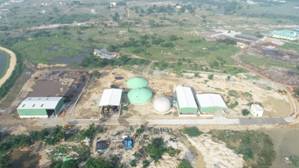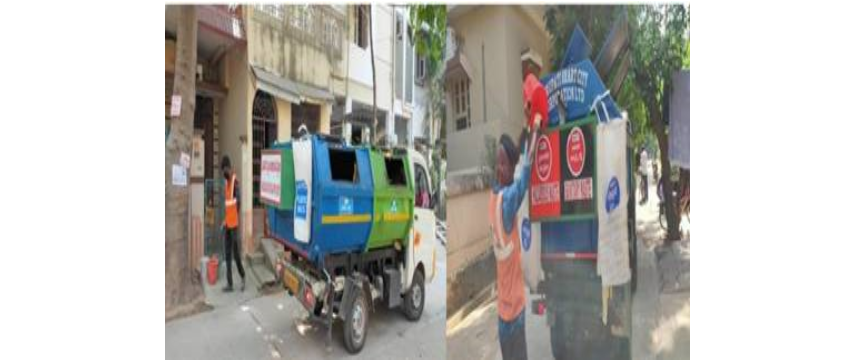Despite being the largest Urban Local Body (ULB) in Andhra Pradesh’s Chittoor district, Tirupati Municipal Corporation has demonstrated its commitment to cleanliness securing the 8th spot among cleanest cities with a population of over 1 lakh in the Swachh Survekshan 2023 rankings.
Not just that, the city has also achieved a 5-star Garbage Free City (GFC) and Water plus rating, establishing itself as the cleanest State capital in the nation.
Tirupati, a city generating approximately 115 tonnes per day (TPD) of wet waste, 15 TPD of food waste, 61 TPD of Dry Waste & Recyclables, 1 TPD of domestic hazardous waste, and 2 TPD of plastic waste, along with an additional 25 TPD of construction and demolition waste, has prioritized robust waste management. All waste collected gets scientifically processed at the respective waste processing and management facilities.
Tirupati, a city generating approximately 115 tonnes per day (TPD) of wet waste, 15 TPD of food waste, 61 TPD of Dry Waste & Recyclables, 1 TPD of domestic hazardous waste, and 2 TPD of plastic waste, along with an additional 25 TPD of construction and demolition waste, has prioritized robust waste management. All waste collected gets scientifically processed at the respective waste processing and management facilities.
The Tirupati MC team has employed nearly 1000 sanitation workers dedicated to ensuring sanitation services. Achieving 100 per cent door-to-door waste collection, the city covers every gate by providing essential infrastructure, including Ghanta Gaddis or auto tippers equipped with blue, green, and red compartments for segregating plastic and non-plastic waste.
The city employs an Online Waste Management System (OWMS) with RFID technology for real-time door-to-door waste collection tracking. Coupled with continuous monitoring and dedicated sanitation efforts, this has ensured a successful 100 per cent collection rate from all gates. With 238 identified transfer points, the city allocates 57 vehicles for secondary collection.
Decentralized waste processing in Tirupati eases the burden on centralized plants, reducing their workload and transportation costs. The focus is on processing wet waste in markets and gardens where significant quantities of organic waste are generated. There are six decentralized waste processing facilities that are located at 3 major markets and 3 gardens. Apart from this, the city has installed 3 Bio Chest machines at three different locations. Tirupati Municipal Corporation identified and classified 27 bulk waste generators producing over 100 Kgs daily and 60 generators producing 50-100 Kgs daily.

In Tirupati, around 60 tons of dry waste and 1 ton of domestic hazardous waste are generated daily. Situated within the integrated waste management facility at Thukivakam, this centralized facility functions as a material recovery facility. Here, waste is systematically segregated into recyclable and non-recyclable items. Recyclable materials are sold to relevant recycling entities, while others are directed to RDF or undergo co-processing in cement factories’ kilns.
Tirupati generates 2 TPD of plastic waste daily, prompting the implementation of various measures for efficient processing. The plastic waste is currently managed at the Plastic Waste Management Facility at a transit shed in Thukivakam, equipped with a capacity to handle 5 tons per day, primarily focusing on low-grade plastic. Currently recyclable plastic is sold to recyclers, while non-recyclable plastic is directed for co-processing at Dalmia Cements.
The plastic waste is currently managed at the Plastic Waste Management Facility at a transit shed in Thukivakam, equipped with a capacity to handle 5 tons per day, primarily focusing on low-grade plastic. Currently recyclable plastic is sold to recyclers, while non-recyclable plastic is directed for co-processing at Dalmia Cements.
To enhance plastic waste processing, a permanent shed at the integrated waste management facility in Thukivakam is being constructed. This initiative aims to boost the value extracted from plastic waste generated in the city, marking another significant step in effective plastic waste management.Tirupati has introduced a Washing Plant and an Agglomerator Machine (Dhana Machinery) for recycling plastic waste in a unique way. This machinery has enabled the MC team to sell 263.29 tons of plastic granules over the course of the year.
The Bio-methanation plant, part of the Bio Green City Waste Management facility in Thukivakam, converts 50 TPD of organic waste into bio-methane gas. High-fibre organic waste is utilized to produce quality compost for agriculture, while the generated bio-gas, approximately 1728 m3 daily, is sold to hotels and industries for cooking, energy, and vehicle fuel. The plant also yields 5 tons of compost daily.
Tirupati produces 20-25 tons of construction and demolition (C&D) waste daily. To address this, the Tirupati Municipal Corporation partnered with Pro Enviro Solutions to establish a C&D waste management facility with a 60-ton capacity in Thukivakam.
After the processing of waste, processed materials are utilized as raw materials for manufacturing kerb stones, tiles, paver blocks, etc. and are further used by Municipal Corporation for developmental works in footpaths, roadside, parks etc.
Ramapuram dumpsite in Tirupati, previously burdened with 2 lakh tonnes of waste, has now been completely remediated, and an additional 25.65 acres of land have been reclaimed. Tirupati’s commitment to effective waste management, heightened citizen awareness, and a vision for inclusive sanitation positions it as a pioneering city in the Swachhata initiative.


